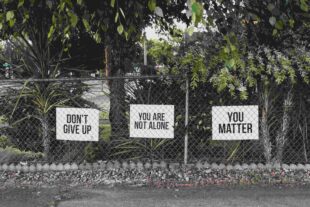What is Mental Health Coaching?
Kristen Zuray
Over the past few years, especially with the effects of the COVID-19 pandemic, the number of those needing mental and emotional help has increased. This has made the caseload for Psychiatrists, Psychologists, and Therapists increase. It is in the wake of all of this that a new role has emerged in the form of mental health coaches.
 It was observed that some who are waiting to receive the services of traditional psychologists or therapists are not suffering from deeply diagnosed mental health problems but need more support, education, awareness, and accountability to face some of life’s temporary problems.
It was observed that some who are waiting to receive the services of traditional psychologists or therapists are not suffering from deeply diagnosed mental health problems but need more support, education, awareness, and accountability to face some of life’s temporary problems.
To understand the work they do and their scope of practice, we will look at what mental health coaches can assist with and those areas they will not be able to assist. This is important so that the public can be informed and seek help from the right mental health professionals. If ever in doubt, it is advisable to ask your local GP about mental health coaches and get their recommendation seeing that it is a fairly new field.
What mental health coaches can assist with.
Much like Therapists or counselors, mental health coaches will create a safe and confidential environment that is conducive to their work. They are invested in the well-being of their clients and will listen and offer space where those clients will be heard.
They do not come in as the experts who tell people what to do but will work hand in hand with their clients to achieve the required and agreed-upon targets. Below is a list of what mental health coaches can help individuals with:
- Achieving developmental goals that are either personal, professional, health, or education-focused.
- Dealing with life’s transitions like going to college, relocations, parenting, starting a new job, or starting a new relationship.
- Support during difficult life situations like the death of a loved one, recovery from divorce or break-up, dealing with difficult health results, losing one’s job, or struggling with debt
- Provide guidance and support for building skills to manage life
- Help dealing with emotions and conditions that might be a result of life’s challenges like burnout, stress, grief, heartache, codependency, anxiety, and relational and family problems.
- They act as a sounding board for one’s ideas and plans. They can provide a fresh perspective and challenge individuals to pursue the best life possible
- Just like sports coaches, they provide accountability and motivation. We all need people who can see our strength and potential and give us the support we need to self-actualize.
- Mental health coaches can help individuals who are feeling stuck in life get back on track by offering support, education, accountability, and a listening ear.
- They provide tailor-made support for improving people’s mental health and general well-being.
What mental health coaches cannot help with.

Just like any profession, everyone has a scope of practice that they operate in. This is also the case with mental health coaches. It is important to note that mental health coaching is not a substitute for therapy, nor should it be advertised as such. Mental Health coaches can sometimes work alongside Therapists and Psychologists to supplement the work they are already doing.
- Mental health coaches cannot diagnose. They will often refer or recommend that clients seek a diagnosis and treatment plan from a mental health professional like a Therapist or Psychologist. They usually work as part of a Multi-Disciplinary team.
- They are not qualified to prescribe medication.
- Complex mental health conditions like PTSD, severe anxiety and depression, Schizophrenia, and others cannot be attended to by mental health coaches. These are outside their scope of practice. This is also true for conditions where clients are taking medication, which cannot be monitored by mental health coaches.
- Mental health coaches do not provide crisis intervention or emergency mental health services. If anyone is in a crisis they should seek the services of an emergency room or call a crisis intervention hotline.
A mental health coach is therefore an individual who goes through training to be a coach with a special focus on mental and emotional wellness. Organizations like the International Coaches Federation (ICF) are responsible for the training and accreditation.
Contrary to popular belief, mental health coaches do not use a “one-size-fits-all” approach. In their work, they make use of several techniques, some borrowed from psychology and behavioral sciences to cater to their clients’ needs. Below are some of those techniques:
Goal setting.
Depending on what the client needs help with, mental health coaches help them identify what it is they need from the sessions and set up goals. This alone provides a sense of direction as they give clear and achievable outcomes
Motivational interviewing.
This is a technique many coaches use that is predicated on the belief that people are more likely to achieve their goals or change their behavior if they are motivated to do so.
Psycho-education.
Coaches rely on providing their clients with additional resources like books, podcasts, or articles that address topical issues relating to them. They understand that not all can be covered in one hour of meeting. They also know that education is empowering.
Stress management skills.
If required, mental health coaches can equip their clients with stress management strategies. These could include mindfulness, prayer, meditation, and or breathing exercises.
Behavioral change.
By using cognitive behavioral techniques, mental health coaches give their clients skills to challenge negative thought patterns that lead to undesirable behaviors.
 Positive psychology.
Positive psychology.
This is a technique that mental health coaches use to divert a client’s attention from what they might deem negative and instead shine the light on their strengths, abilities, natural talents, and positive beliefs to help them achieve their set goals.
Accountability.
The fact that mental health coaches focus on the here and now means that they provide their clients with someone they can be accountable to in real time. Their input is measured and encouraging. This can be a great source of encouragement and motivation for those needing support in certain areas of their lives.
Strength-based approaches.
Mental health coaches can use methods like the strength finder to help clients identify their strengths. These strength-based approaches are essential in boosting client’s confidence and working with strength is a more empowering approach to goal achievement.
Journaling and homework.
Journaling and completing self-assessing homework are a huge part of mental health coaching. This way the clients take ownership of their progress and give themselves time to reflect and gain more self-awareness.
Conflict resolution.
 This can be client-specific, but most of us need a working strategy for dealing with conflict as that is a normal part of everyday life. This can be done through building a client’s ability to communicate effectively and gain a working understanding of emotional and relational intelligence so they can manage interpersonal interactions, even the difficult ones.
This can be client-specific, but most of us need a working strategy for dealing with conflict as that is a normal part of everyday life. This can be done through building a client’s ability to communicate effectively and gain a working understanding of emotional and relational intelligence so they can manage interpersonal interactions, even the difficult ones.
Mental Health Coaching has been noted to have many advantages for those who qualify to use it. Apart from the fact that it is more affordable than traditional therapy, it also means people do not have to wait long before their local therapist has space for them.
It has also been useful for those people who feel they have dealt with the traumas and effects of past events and now want to focus on growth and development. As mentioned earlier, mental health coaching can be a complementary service for those who are in therapy and counseling. This will give a more holistic treatment program.
Is mental health coaching for you?
If you have gone through this article and are confident that a mental health coach will be invaluable to your personal development or help you through a difficult temporary situation, please do not hesitate to contact us. We can connect you to mental health coaches who are ready to give you the support and help you need this season.
“Don’t Give Up”, Courtesy of Dan Meyers, Unsplash.com, CC0 License; “Directions”, Courtesy of Jamie Templeton, Unsplash.com, CC0 License; “Get Up”, Courtesy of Valeriia Miller, Unsplash.com, Unsplash+ License; “High-Five”, Courtesy of krakenimages, Unsplash.com, CC0 License





